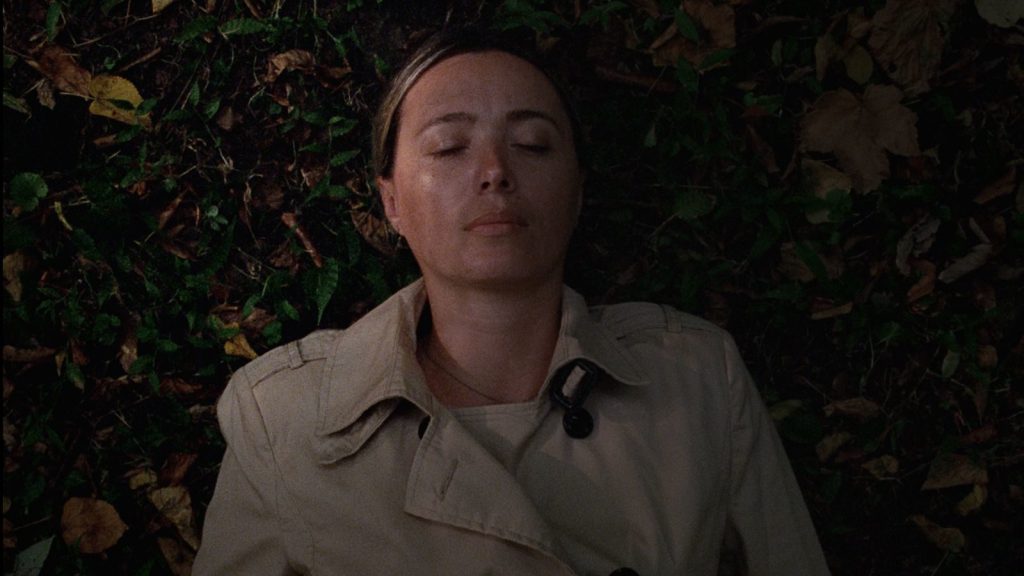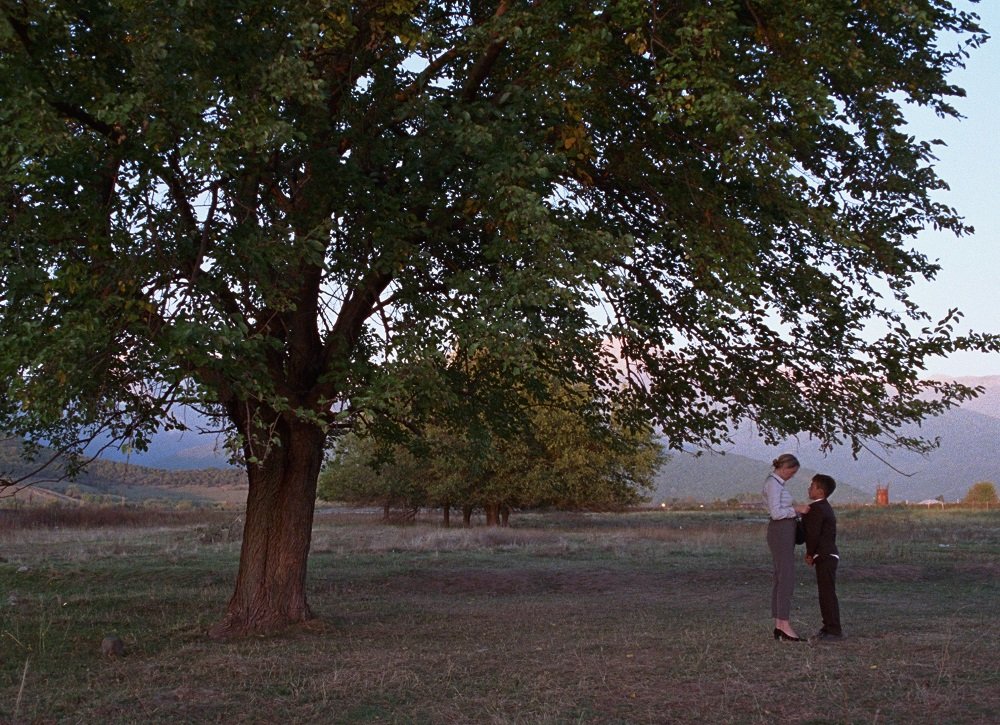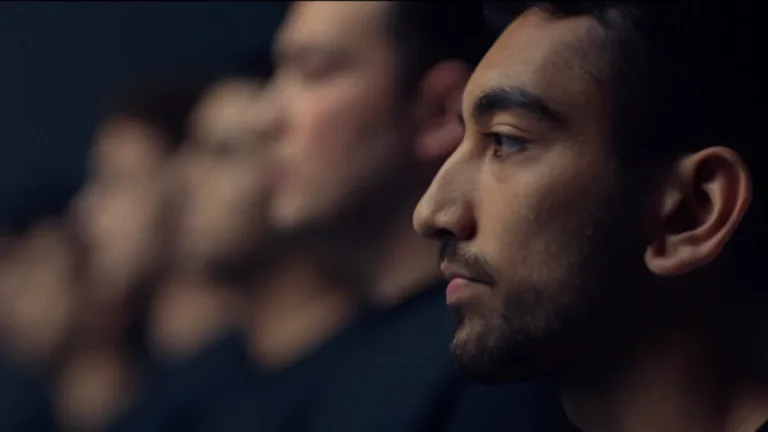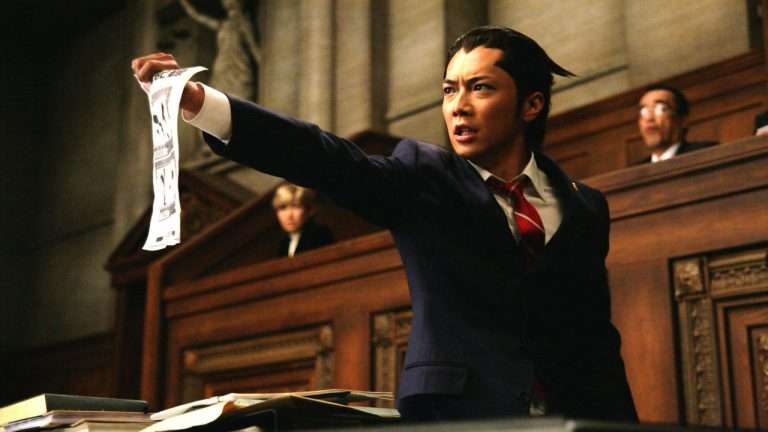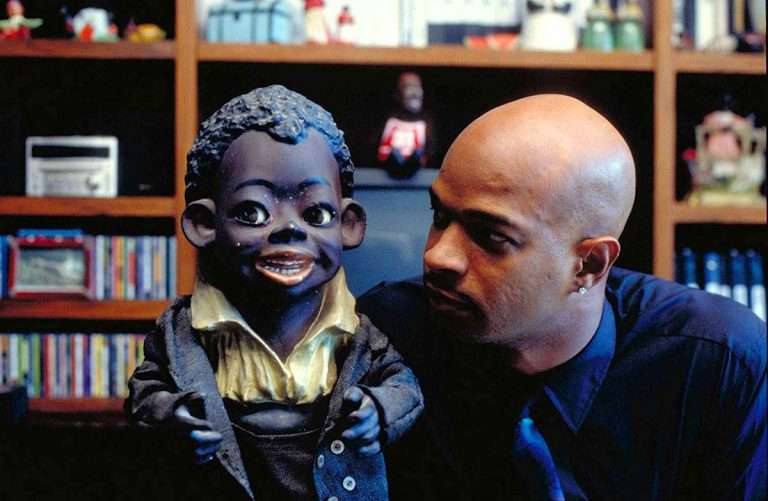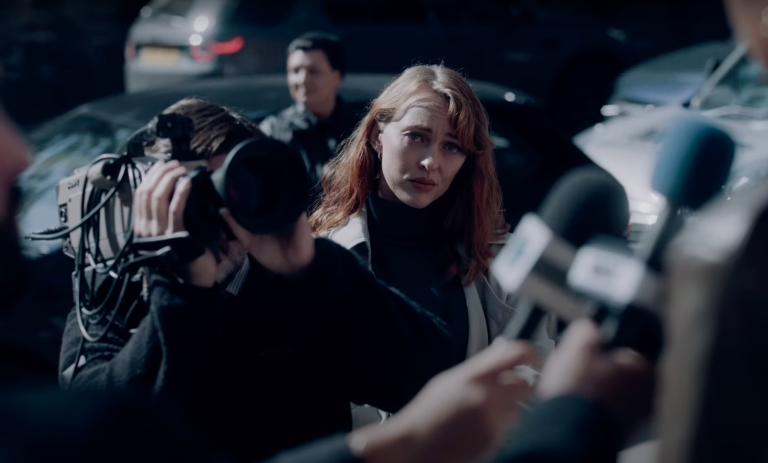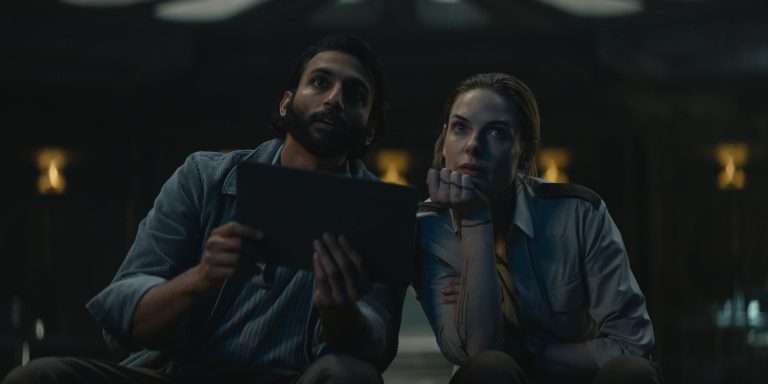Georgian director Dea Kulumbegashvili’s debut feature Beginning (2020) revolving around the oppressed religious sect brings together quite a number of references from antic mythology, mystical tradition, social issues of contemporary Georgia, Renaissance art, and mostly the imagery of the acclaimed masters of cinema creating meditative experience into a feminist redemption. A considerable number of reviews correlated Beginning with Carlos Reygadas, Romanian New Wave, Chantal Akerman, or even with Pasolini, referring to Kulumbegashvili as a feminist-descendant of those who made one of the most conflicting cinematic masterworks.
Beginning exhibits Jehovah’s Witnesses repressed in Orthodox Christian hegemonic society, and neglected by the power structure. However, the director not only surveys difficulties associated with being a religious minority, mainly she observes a woman in multiple layers of patriarchal absolutism. The portrayal of Jehovah’s Witnesses isn’t only a directorial decision just to condone the picture’s mystical form.
Recommendations Based on Beginning (2020): Wait Until Dark (1967): 50 Years Later
During the initial years of the 2000s, the community had routinely been an object of violent outbursts of Christian Orthodox radicals. Even in these times, their churches are almost invisible on the architectural surface of Georgia while the members themselves are still under a lot of pressure of discrimination, intolerance, mockery, etc. including working conditions or social engagement. Kulumbegashvili, here, challenges us to insight into the institutional complexity of the congregation from an extremely subtle view of a subjugated woman whose final transgression collapses the beginnings of tyranny.
Yana (Ia Sukhitashvili) is depicted in the middle of the 1:33 aspect ratio lenses with her grief and burden of being a wife of a religious leader, David (characterized by Rati Oneli a co-writer and producer). The initial shot of the Beginning predicates the stasis of the aesthetics configured with claustrophobic framing as evidence of the protagonist’s mental, physical, or institutional incarceration. The take is about eight minutes long of a stationary camera exposing incremental gathering of Jehovah’s Witnesses at their praying venue with David later on conducting a sermon about Isaac and Abraham.
The dramaturgy of the composition is ruthlessly conspicuous with a bordering choreography: a gathering hall is sharply lit in vast space – crimson carpet in the center adjoining chairs and no signifier of religiousness but Kulumbegashvili conducts an ambiance of ineffability by playing with divine light. While David enacts the ritual drama the community is attacked with firebombs and locked people struggle to getaway. Practically every scene is pictured this way: something very peacefully noetic starts to unfold on a screen but is attacked, stuck, and interrupted with external usually patriarchal interferences.
During the Tarkovskian representation of a burning house mysterious man (Kakha Kintsurashvili) emerges who later claims to be a police detective, the image transforms into more fluid and dark. The question is why Kulumbegashvili erupted playing with such a dazzling light and conceptual darkness. In an attempt to answer the doubt it is profound to seek the solution in various esoteric traditions as the director herself noted in a way, for her, ‘it’s always waiting for the miracle’[i] while shooting and the picture is ultimately completed with the disturbing metaphysical act.
One of the crucial connections of mysticism and cinema are highly ingrained with various attitudes toward light and dark, for instance, a ‘monist expectation is that the light in the darkness will absorb the spectators and suture them into the filmic text, creating the illusion that the screen is an extension of the self.’[ii] So with this heavenly outburst Beginning (2020) violently drags the audience into the filmic experience to identify with the disturbing passivity in preparation for the more vulturine encounter.
After the incident police ask David to delete the record of a surveillance camera but he immediately embarks to the city at a central office for a week in an endeavor of building a new chapel and with a hope of promotion in his career as a preacher. Suddenly Kintsurashvili’s personage sexually assaults Yana at her house delineated with Hanekean unpleasant approach, few days later he rapes her by the river. Then Yana visits her mother seeking empathy and support to overcome her rape trauma only she gets a bunch of women mansplaining. With the understanding that the police station knew nothing of the so-called detective and with the arrival of her husband the assaulter seemingly fades away leaving a dysfunction in the family doomed to destroy.
Related to Beginning (2020): Dasatskisi MUBI Review
Essentially, it is instrumental to interpret the Beginning in the light of one of the most widespread myths of sacrificial assassinations like the Greek myth of Medea, where a descendant of mythical gods betrays, slaughters, and sacrifices her divine and royal family members in an attempt of self-redemption. Yana kills her childhood dream of being an actress because of the family just like Medea kills her emotional attachment by sacrificing ‘her brother Absyrtus out of love for Jason.’[iii] Family in Beginning (2020) also exemplifies the type of grand family, superior to the average working-class with an imprimatur of religious enlightenment. So we have Yana (Medea) here a representative of woman power for the abruption of the prevailing order.
Feminist film theorists hypothesize classic narrative cinema is structured with the dominant, sadistic male gaze. That is why the Georgian female director’s determination of speaking counter-language stands excessively creditable in understanding gender presence on screen. While popular narratives compound objectification of women’s bodies female spectatorship is primarily linked with ‘the masochism of over-identification.’[iv] Here, the auteur alters the rules of the game letting women spectators not identify with Sukhitashvili’s character distancing the camera off her body that engenders the Brechtian alienation effect.
Displacement of female gaze conception stimulates Kulumbegashvili to rearrange characteristic roles. If David, a male chauvinist, passively humiliates Yana, the hero of Kinsturashvili a remarkable debaucher represents a pure sadist, while her son is an emblem of upcoming masculinity who repeatedly terminates external and internal meditative atmospheres; then Yana’s identity living in this environment could be a masochist. So the director liberates female spectators by enslaving the female character, but the dilemma of self-abjection firmly appears.
Yana’s quote in the beginning – ‘something’s wrong with me. It’s as if I were waiting… for something to start or to end’ – emerges as intrigue in the end that as if she went outside because of waiting for a terrible thing to happen. It’s credible to consider Yana as a masochist and male characters as sadists. Thus another paradox arises up here as a popular joke Gilles Deleuze addresses in his Coldness and Cruelty. Masochist meets sadist; the masochist says: “Hurt me.” And the sadist replies: “No”. Deleuze describes the joke as unrealistic and foolish ‘because a genuine sadist could never tolerate a masochistic victim’ while ‘neither would the masochist tolerate a truly sadistic torturer.’[v]
Also Read: The Girl and The Gun (NYAFF) Review
The executing conundrum is around Yana’s way of liberation. Instead of turning her into a hapless dupe, Kulumbegashvili provokes her incarceration as a divine discipline of sacralization. Violence here at first represents an act of historical revenge on the gender hierarchical system; a bunch of the references could evoke an understanding of the Beginning as it represents a cross-cultural visual text ‘with a grueling masterwork that oscillates between strident peaks of frustration and anxiety, meditation and poetics.’[vi] And as the director recognized in an interview with MUBI she was waiting for a miracle to happen, so an expectable thing occurs but controversially because the only way to battle against hegemony is to talk a counter-language of hegemony.
citations:
[i] Waiting for the Miracle: Dea Kulumbegashvili Discusses “Beginning” on Notebook | MUBI
[ii] Mystical Gaze of The Cinema; Richard Leonard; p.71
[iii] Masochism and Anti-capitalism according to Pasolini; Fabio Vighi; p.65;
[iv] Film and Masquerade: Theorising the Female Spectator; Mary Ann Doane; p. 77;
[v] Coldness and Cruelty; Gilles Deleuze; p. 40;
[vi] Beginning (2020) | Review – IONCINEMA.com

